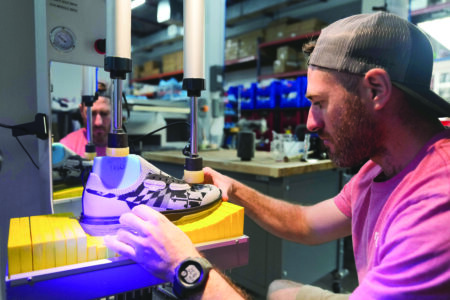New baby in home means changes

There is a new baby in the home. Parents are exhausted. Grandparents are ecstatic. What does the American Academy of Pediatrics recommend? The first year this beautiful baby will grow from someone who snuggles, coos, and lies around to someone who is running around exploring and saying first words.
Within hours of birth babies can respond to voices. Within days they may start imitating expressions on faces with big eyes, big smiles and soft voices changing pitch.
Talking to babies in soft voices avoiding baby talk from the beginning is very important for language development. When family members run out of things to say, start reading all of the books available written in beautiful language especially poetry. The newborn is listening and enjoys hearing human voices reading and singing.
Comforting
It’s important to have only soft music and media around because their ears and other senses are very sensitive and will startle or damage easily. Both baby and families will enjoy holding, feeling comforted, and bonding. Look into baby’s eyes with your eyes wide open and a big smile while you carry on a one sided, soon two sided conversation of cooing and babbling.
In the second and third months, babies may sleep five to six hours a night and take three naps a day. Every baby is different. Some are easy. Some are not. Parents are known to take drives around the block until they finally sleep. Babies at this stage will hold on to your fingers, smile and giggle. They will follow you with their eyes and hold their head a little steadier. The rest of their body will wiggle and try to turn over.
Newborns normally cry about two out of 24 hours. After a while families recognize different cries. When your baby is crying, check the basics first: wet, messy, hungry, tired, too hot, chilled, sick? When babies are out of sorts they need to be held, comforted, and rocked. There are many different holding patterns: over the shoulder, in the front, on the lap, or in a sling.
Crying
While snuggling gently, not jiggling, try a massage. Rubbing the back in circles works well. Tummy massages from right to left up to the ribs around the face and shoulders while singing softly may be soothing. Your attention, talking softly, singing, gentle rocking, carrying, touching, and feeding stimulates the baby’s senses and brain growth.
If nothing seems to work it is OK to put your baby down for a few minutes. Maybe the massaging and singing are keeping the little one awake and maybe you need a break, too.Then you will be ready to try again. For more see healthychildren.org from the American Academy of Pediatrics, grandparentsteach@gmail.com,and wnmufm.org/Learning Through the Seasons.
EDITOR’S NOTE: Grandparents Teach, Too is a non-profit organization of elementary and preschool teachers from Marquette, Michigan. The writers include: Jan Sabin, Mary Davis, Jean Hetrick, Cheryl Anderegg, Esther Macalady, Colleen Walker, Fran Darling and Iris Katers. Their mission since 2009 is to help parents, grandparents, and other caregivers of young children provide fun activities to help prepare young children for school and a life long love of learning. They are supported by Great Start, Parent Awareness of Michigan, the U.P. Association for the Education of Young Children, Northern Michigan School of Education, the Upper Peninsula Children’s Museum and the Northern Michigan University Center for Economic Education.





